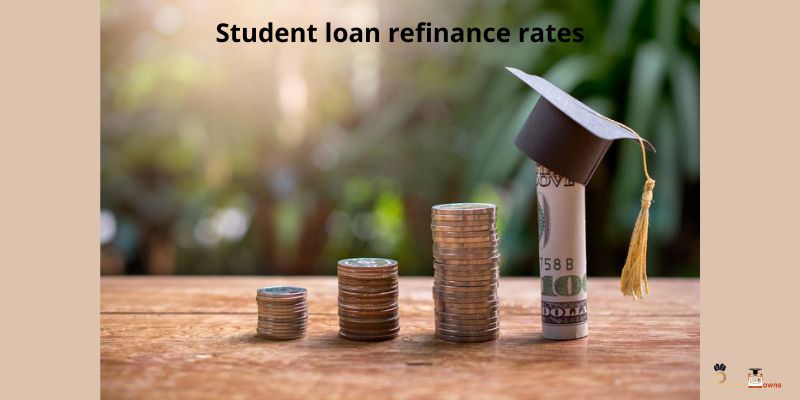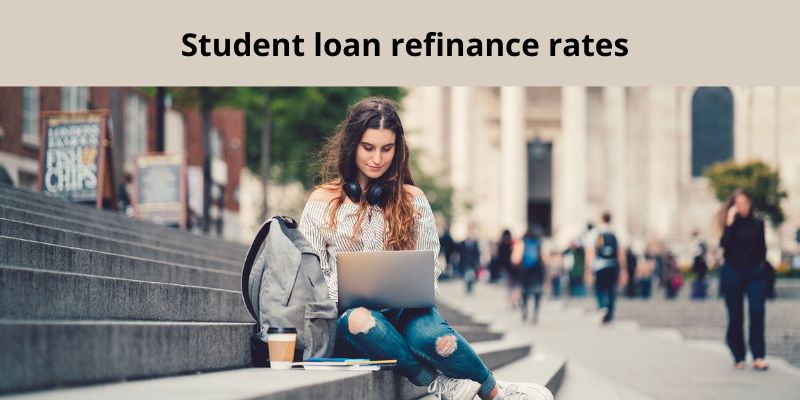Blog
How to Secure the Best Student Loan Refinance Rates
You already know how overwhelming student loans can be if you have any. It might be difficult to keep track of everything with numerous loans, hefty interest rates, and varied monthly payments. Refinancing student loans can help in this situation. Student loan refinancing can make payments easier, lower interest rates, and result in cost savings over the course of the loan.
But before you refinance your student loans, it’s important to know what factors determine the rates and how to get the lowest possible rates. In this post, perfumetowns.com look at the variables that affect student loan refinance rates and offer useful advice for getting better deals.
Factors that Affect Student Loan Refinance Rates

Your student loan refinance rates are influenced by several factors. The following are the most significant factors to consider when refinancing your student loans:
Credit Score: Your credit score is one of the most crucial factors that lenders consider when determining your student loan refinance rates. A higher credit score typically translates to a lower interest rate, while a lower credit score can result in higher rates or even rejection. If your credit score is less than ideal, consider taking steps to improve it, such as paying off debt, making on-time payments, and disputing errors on your credit report.
Income and Employment Status: Lenders also consider your income and employment status when determining your student loan refinance rates. A higher income and stable employment history can help you qualify for lower rates. Lenders may also consider your debt-to-income ratio, which compares your monthly debt payments to your monthly income. A lower ratio indicates that you have more money available to pay off your student loans, which may lead to better rates.
Loan Amount and Term: The amount you want to refinance and the term you choose can also affect your student loan refinance rates. Generally, the more you borrow and the longer the term, the higher your interest rate may be. To get the best rates, consider borrowing only what you need and choosing a shorter loan term if possible.
Type of Interest Rate: Student loan refinance rates can be either fixed or variable. Fixed rates stay the same for the life of the loan, while variable rates can fluctuate based on market conditions. Variable rates may start lower than fixed rates, but they can also increase over time, leading to higher monthly payments. Consider your financial situation and risk tolerance when choosing between fixed and variable rates.
Strategies for Securing Better Student Loan Refinance Rates

Now that you know what factors influence student loan refinance rates let’s explore some strategies to help you secure better rates:
Improve your credit score: As mentioned earlier, your credit score is a significant factor in determining your student loan refinance rates. Take steps to improve your score, such as paying off debt, disputing errors on your credit report, and making on-time payments. Even a small improvement in your credit score can result in significant savings over the life of your loan.
Shop around for lenders: Don’t settle for the first lender that offers you a student loan refinance. Shop around and compare rates and terms from multiple lenders. You can use online comparison tools to make the process easier. Be sure to read the fine print and understand all fees and charges before signing on.
Consider co-signers or creditworthy borrowers: If your credit score or income is not high enough to qualify for the best rates, consider adding a co-signer or creditworthy borrower to your loan application. Their creditworthiness can help you secure better rates and terms.
Choose shorter loan terms: Choosing a shorter loan term can result in lower interest rates. While shorter terms may lead to higher monthly payments, they can save you money in the long run by reducing the amount of interest you pay over the life of your loan. Use a loan calculator to see how different loan terms can affect your monthly payments and total interest.
Opt for fixed interest rates: Fixed interest rates provide stability and predictability, making it easier to budget for your monthly payments. While fixed rates may be slightly higher than variable rates initially, they can save you money over the life of the loan by protecting you from interest rate increases.
Potential Risks and Drawbacks

While student loan refinancing can be an excellent way to simplify your payments and save money, there are also potential risks and drawbacks to consider. The following are some of the most significant risks and drawbacks:
Prepayment penalties: Some lenders may charge prepayment penalties if you pay off your loan early. Make sure you understand all fees and charges before refinancing your student loans.
Fees and charges: In addition to prepayment penalties, some lenders may charge origination fees, application fees, or other charges. These fees can add up and negate the savings you may get from a lower interest rate. Be sure to understand all fees and charges before signing on.
Loss of benefits and protections: Federal student loans come with certain benefits and protections, such as income-driven repayment plans, loan forgiveness programs, and deferment and forbearance options. When you refinance your federal student loans into a private loan, you lose these benefits and protections. Make sure you understand the trade-offs before refinancing.
Risk of default: If you refinance your student loans and then fall behind on payments, you could face default. Default can have serious consequences, such as damage to your credit score, wage garnishment, and legal action. Make sure you can afford your monthly payments before refinancing.
Conclusion
Refinancing your student loans can be a good method to lower your interest rates, streamline your payments, and save money overall. But it’s important to comprehend how to get the finest rates and what factors influence your student loan refinancing rates. You can boost your likelihood of getting the best rates by raising your credit score, looking around for lenders, taking into account co-signers or creditworthy borrowers, selecting shorter loan terms, and choosing fixed interest rates. Make sure to weigh the potential risks and disadvantages before deciding, then match your choice to your financial objectives and top priorities.
